Main Menu · Search ·Current Issue ·Contact ·Archives ·Centennial ·Letters to the Editor ·FAQs

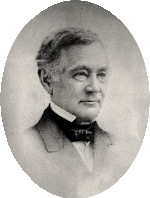 William Fletcher Weld Photograph courtesy Harvard University Archives. The stylized "W" above is adapted from the weathervane and stone ornaments on the Flemish gables of Weld Hall in Harvard Yard. |
In this centennial issue of Harvard Magazine, the editors sought to capture the flavor of the University's past in part by depicting a family whose members have long been educated here. Many families would qualify. We chose to focus on the Welds for several reasons, including one quite close to home: Philip Saltonstall Weld '36 (see below) played an important role in this magazine's history.
Welds have been at Harvard almost since the first classroom opened its door--and the family's genealogy goes back even further than that: one William Weld was sheriff of London in 1352. Three centuries later, the first of the family to attend Harvard, John Weld (born in 1625), found himself on the other end of the constable's stick. In 1644, he and a classmate robbed two houses of 11 pounds in money and 30 shillings' worth of gunpowder. When found out, they were expelled from the College after having been whipped by President Henry Dunster himself. John Weld returned to England, where he became a minister in the bishopric of Durham.
The first Weld to graduate was Edmund Weld (1631-1668), A.B. 1650, who became a minister in Ireland. During the seventeenth and eighteenth centuries, 18 more Welds and three Weld spouses followed Edmund through the Yard, but we can conveniently begin the saga of the modern-day dynasty with William Gordon Weld (1775-1825) and Hannah (Minot) Weld (1780-1860). This pivotal couple produced one daughter and eight sons; one boy was killed in Mexico, but the remaining seminal septet sired 813 descendants (see chart).
A handful of these descendants are profiled here. Source material varies: the portraits of earlier Welds depend on documents; those covering more recent offshoots benefited from interviews. The privately printed 1938 book Weld Collections, by Weld spouse Charles Francis Robinson, is an invaluable source of genealogical and biographical data. We owe an even greater debt of gratitude to the singular genealogist and historian Nicholas Benton '51, another Weld spouse. He is the husband of Kitty (Bigelow) Benton (granddaughter of Rudolph Weld '05) and the father of Emily Weld Benton '84 and Louisa Barclay Benton '86.
This summer, Emily Benton married John Morgan at the Bentons' summer home in Wareham, Massachusetts, near Cape Cod. The cottage, known as West House, is one of six separate houses at Indian Neck in Wareham; the group of homes amount to a family compound of sorts, and if the Weld clan has a family seat, this is it. Indian Neck commands a majestic view of Bourne Cove and the Atlantic Ocean. In 1881 "the General"--Stephen Minot Weld Jr. (see below)--and his cousin William Minot bought the property. Generations of Welds have lived here, although in recent decades a preponderance of female offspring in the New England branches of the family has made the Weld surname rare at Indian Neck; the graceful cottages now house Bigelows, Bentons, and Baldwins.
One former denizen of Indian Neck, Anna (Reed) Parsons (1858-1958), shows how the events of a single lifetime can telescope history. As a young girl, she witnessed Abraham Lincoln's funeral cortege. In time she married William Barclay Parsons Jr., chief engineer of both the New York City subway system and the Cape Cod Canal. Their daughter, Sylvia, married Rudolph Weld '05, son of "the General," and their daughter Sylvia--who is now 89--may be the oldest living member of the Weld family. During the 1930s, the younger Sylvia recalls, she once visited her grandmother Anna in New York City and happened to mention that she planned to vote for Franklin Delano Roosevelt, earning herself a scathing rebuke. Sylvia then suggested that her grandmother's political guidance was predictable, because she had always supported the Republican Party. "No, I haven't!" the older woman burst out. "Only since McKinley!"
William Fletcher Weld (1800-1881)
Ironically, William Fletcher Weld, who built the first great Weld fortune and Weld Hall in Harvard Yard, never attended college. He had prepared for Harvard, as one of the sons of dynasty-founders Hannah (Minot) and William Gordon Weld, a prosperous shipmaster and ship owner. During the War of 1812, however, a British frigate cruising off Boston harbor captured one of the family's ships--with the patriarch himself in command--carrying a valuable cargo of wine and Spanish silver dollars. This financial disaster canceled young William's college plans. At 15, he became a clerk for an importer in Boston; by 22, he had set himself up in the dry-goods trade. But a partner's badly managed ventures mired the young company in debt, and Weld did not find his way to affluence until he entered the shipping trade that had once enriched his father. By 1833, he had made enough money to build the Senator, the largest ship of its time.
Weld eventually became one of the most successful merchant-ship owners in the country, with 51 sailing vessels and 10 steamers. Yet in time he foresaw the decline of American shipping and sold off his fleet to focus on urban real estate and railroads, in particular the Boston and Albany and Boston and Maine lines. At his death, he left an estate estimated at $20 million. He had married twice, fathering six children by his first wife, Mary (Perez Bryant), and one son by his second wife, Isabella (Walker). That son--George Walker Weld (see below)--donated Weld Boathouse. Thus, although legions of Welds have attended the University over the centuries, this father-son pair are responsible for the two Harvard buildings that bear the family name.
Stephen Minot Weld, A.B. 1826, A.M. 1829 (1806-1867)
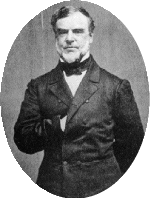 Stephen Minot Weld Photograph from War Diary and Letters of Stephen Minot Weld
Stephen Minot Weld Photograph from War Diary and Letters of Stephen Minot Weld |
Tours of the Old Yard often pause near Weld Hall while the guides note that John F. Kennedy '40 lived there during his freshman year. The building's namesake, Stephen Minot Weld, was another of the sons of William Gordon and Hannah Weld. In 1870, Stephen's eldest brother, William, donated the funds to erect Weld Hall in his memory. The building, which was constructed between 1871 and 1872, carries the inscription:
STEPHANO MINOT WELD
VIRO DE VNIVERSITATE OPTIME MERITO
FRATRI FRATER
(To Stephen Minot Weld, a man deserving well of the University, his brother [dedicates this] to his brother.)
As an undergraduate, Stephen was, according to a classmate, "the most popular member of his class, and this without seeking it, without any concession of principle, by virtue of his sterling worth, his elastic spirits, and his strong social sympathies." These qualities must have served him well as master of the private school in Roxbury that he founded in 1827 and taught at for the ensuing three decades. More than a thousand boys from all parts of the country, and even Cuba and Mexico, attended the school, many in preparation for Harvard.
Weld also had a keen business sense and accumulated a sizable estate through shrewd investments in Jamaica Plain real estate. The Massachusetts legislature twice elected him to the Governor's Council. He was a presidential elector on the Lincoln ticket in 1864, and helped raise recruits for the Union cause in which his eldest son, Stephen Jr., distinguished himself. After Appomattox, Weld belonged to the committee that raised a quarter-million dollars to fund the construction of Memorial Hall in honor of Harvard's Union war dead; many believed the money could not have been raised without his enthusiasm and energy.
William Weld honored his brother's memory with a building for the College in part because of Stephen's great reputation among Harvard men. An Overseer from 1855 until his death, Stephen was the prime mover in a 14-year effort that secured passage of the 1865 law authorizing Harvard alumni to elect the members of the Board of Overseers--a reform that wrested control away from the Commonwealth and thus in an important way established Harvard as a private college.
On December 5, 1867, while attending a reading in Boston by Charles Dickens, Weld caught a cold that turned into pneumonia, causing his death a week later. At his funeral and memorial service on December 17, there was a great public gathering in Jamaica Plain; his obituary in the Boston Evening Transcript described a "bright, cheerful, warm-hearted man who preserved, as a winning grace, his childlike simplicity to the last," recalling that he had "in every way a genial nature" and noting "the beaming pleasantness of his companionship."
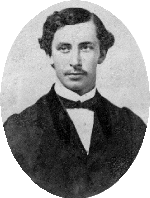 George Walker Weld Photograph courtesy Harvard University Archives
George Walker Weld Photograph courtesy Harvard University Archives |
George Walker Weld, A.B. 1860 (1840-1905)
At his death at age 64, an obituary noted that George Walker Weld--as founder of the Weld Boat Club, in 1889--was "the greatest benefactor Harvard ever had in rowing." In 1889 he also funded the construction of a boathouse, later moved upstream to make way for the current Weld Boathouse, opened in 1906. The same obituary called him "an advocate of healthy, clean sport of a kind that would attract a large number of students."
Weld Boathouse has indeed been a key venue for the democratization of rowing at Harvard. Today it houses the Radcliffe and intramural crews and is the center for instruction in recreational and competitive sculling, open to all members of the University. Young George matriculated in 1856, only four years after the first intercollegiate athletic contest in the United States: the 1852 Harvard-Yale boat race at Lake Winnipesaukee, New Hampshire. By 1889 that regatta had become a popular annual event, yet there were few opportunities for undergraduates eager to row. When Weld's boathouse opened its doors, with 21 new shells, young athletes who had been cut from the varsity and class crews could continue to train in eights, fours, pairs, and singles.
Weld himself had been athletic at Harvard and for some years afterward. But around age 40 "a grave malady" afflicted him. Records do not clarify the nature of his illness, which required a long hospital stay and left him a paralytic. (Although an undated Boston newspaper item notes that "The illness of George Walker Weld has assumed a sad form and he has been carried to the Somerville insane asylum," psychiatric diagnosis was then an even less exact science than it is today, and no other evidence suggests that Weld suffered from mental illness.) He bore his infirmity with cheerfulness, and throughout his life continued to attend Harvard athletic events in a wheelchair or carriage.
As a wealthy Boston bachelor, Weld seems to have greatly enjoyed life. He belonged to several downtown clubs and was a founding member of the Boston Athletic Association, organizers of today's Boston Marathon. He often invited friends to cruise on his 80-foot steel schooner, Chanticleer, considered one of the finest steam yachts in the United States. He belonged to the New York Yacht Club and was part of the syndicate that built the America's Cup defender Puritan.
In 1903 Weld fractured his thigh and his health deteriorated; his obituary attributed death to "a general breaking down." Although he left no direct descendants, he had a family connection to another enduring Harvard (and Charles River) legacy. His niece, Isabel Weld Perkins, was the wife of Larz Anderson, A.B. 1888, LL.B. 1891, donor of the Anderson Memorial Bridge, which has brought Boston traffic directly into Harvard Square since 1913. The carved stone bridge crosses the Charles next to Weld Boathouse, and was purposely designed with "a high enough arch to admit the passage of all sorts of pleasure craft."
Stephen Minot Weld had seven children; the second bore his father's name.
Stephen Minot Weld Jr., A.B. 1860 (1842-1920)
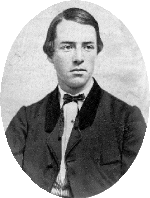 Stephen Minot Weld Jr. Photograph courtesy Harvard University Archives
Stephen Minot Weld Jr. Photograph courtesy Harvard University Archives |
On the honeymoon following his second marriage, in 1904, Stephen Minot Weld Jr. and his new bride toured Civil War battlefields where 40 years earlier the 62-year-old groom had made war, not love. Weld was a first-year student at Harvard Law School when the conflict broke out. He was eager to join the action, and as a member of the Army of the Potomac from 1861 to 1865, he participated in many major conflicts, including the Second Battle of Bull Run, Antietam, and Gettysburg. Twice he was captured by Confederate troops, and twice exchanged; a bullet once pierced his boot and he had his horse shot from under him. Weld rose rapidly from second lieutenant to lieutenant colonel to colonel, and at his discharge in 1865 he was brevetted a brigadier general--at age 23. Even today, members of the Weld clan refer to him simply as "the General."
"The General," however, was no abolitionist, and had "little liking for those he considered antislavery zealots," writes David Herbert Donald. In his foreword to Weld's Civil War diary and letters, republished by the Massachusetts Historical Society in 1979, the Warren professor of American history emeritus observes, "When abolitionist Senator Charles Sumner made an appearance at the Harvard class day exercises in 1860, Weld was a member of the graduating class that booed and hissed him. Like most conservative upper-class New Englanders, Weld disliked slavery, but he had no special sympathy for the sufferings of blacks; he felt that, if left alone, the South's 'peculiar institution' would die out of its own accord." Throughout his war diary--which the General first published himself in 1912 in an
edition of 50 copies for relatives--it is clear that he viewed the Union cause as essentially one of putting down a rebellion, not freeing slaves.
Weld prepared for Harvard at his father's boarding school, and entered the College at 14 years of age. He was an abstemious young man: "I did not touch a drop of wine or liquor all through my college career until about a month before I graduated, nor did I smoke until then," he wrote. "I was up to a great deal of mischief, but got though all right...graduating, I believe, number 28 in a class of 108."
"The whole spirit between the Faculty and the students was one of war," Weld recalled in his reminiscences. ""We looked on the Faculty as our oppressors, and we were--a great many of us--up to every devilment that we could think of, to trouble and bother them....The College then was more in the nature of a boarding-school. There were about four hundred undergraduates, where now [1912] there are some four or five thousand."
His older cousin George Walker Weld was a classmate, and one night came to Stephen's room with a plan to "screw in one of the tutors, named Pearce. The plan was to take a hinge and screw one part to the bottom and the other to the sill of the door, so that in the morning...[Pearce] would find himself locked in and unable to attend prayers, and so could not mark us for our absence." But tutor Pearce was on the lookout, heard George and his friend Osborne at their work, and chased them down the stairs. At the bottom of the flight, George grabbed a banister and swung under the stairs, while Pearce pursued Osborne out into a heavy snowfall. "Osborne plunged into a snow-drift and stuck there, and Pearce jumped on him. They had a row and a good deal of scuffling, and in it Pearce, who wore a red wig, lost it. It got lost in the snow and was never found until the next spring." Osborne was expelled and got his degree many years later, but George Weld's quick wit in swinging beneath the stairs saved him from discipline.
In Stephen Weld's senior year, Cornelius Felton, professor of Greek, was appointed president of Harvard. "We felt very much aggrieved," Weld wrote, "because, at the inauguration ceremonies, which were to take place the day before our graduation, the Latin oration, which had always by universal custom been given to the graduating class, was given to the class below us because our first scholar had not taken Latin as an elective. It caused a great deal of feeling. The members of our choir refused to sing and our class would not take part in the inauguration ceremonies, so they were postponed until the day after our graduation. At a meeting of the Alumni held in University Hall on that day, we proposed a vote of censure on the Faculty for their treatment of us as a class, which was exceedingly ill-advised."
After the Civil War, Weld returned home to misfortune. His beloved father died in 1867; soon thereafter, a felting mill in which he had inherited about $14,000 worth of the stock failed. "[T]he mortification was almost more than I could bear," he recalled. He made a new start by borrowing $25,000 from friends to buy a cotton mill that was connected with the felting mill. "I literally had not a cent left in the world," he wrote. But bad luck dogged him again; a pond two miles upstream broke its dam and the ensuing flood swept the cotton mill away.
Yet this turned out to be a blessing in disguise. To pay his debts, Weld began working as a cotton salesman. Eventually he built a fortune as a successful cotton and woolen broker, opening branches even in Bombay and Japan. There were some huge setbacks, including the embezzlement of $326,000 by an old friend who had become a business partner. But overall, the downtown Boston firm of S.M. Weld and Company prospered and made the General a wealthy man.
In 1869 Weld married Eloise Rodman. The couple lived on a 52-acre estate in Dedham, most of which was surrounded by a high stone wall. Here, Weld indulged his passion for horticulture, creating one of the finest rock gardens in the country. The estate employed eight gardeners year-round, and had a water tower and a dozen greenhouses, one of which was dedicated to growing table grapes all year long. (MIT now owns and operates the property as a conference center known as Endicott House.) Weld became president of the Massachusetts Horticultural Society in 1906, and worked closely with Harvard professor Charles Sargent, founder of the Arnold Arboretum, in building the arboretum's collection.
Eloise Weld died in 1898, having borne six boys and one girl. The General sustained other personal losses. Twins Stephen and Alfred succumbed to rheumatic fever at 17 and tuberculosis at 32, respectively. Eight-year-old Lothrop Motley Weld drowned in the channel at Bourne Cove in Wareham in 1882, just one year after the family had purchased property there for a summer residence. Daughter Eloise died in England at the age of 28, in 1907.
In 1904 the General married Susan Edith Waterbury, who was 24 years his junior and had been governess to his younger sons. In his later years, he spent much of his time at the family compound he had established at Indian Neck. There he created another spectacular garden and built a private 18-hole golf course as well as several comfortable houses. In addition to fishing, golf, and shooting, another hobby was buying beautiful land and then selling it at cost to friends who would take care of it; in this way he acquired and transferred hundreds of acres along the shores of Buzzards Bay.
The General preserved not only land but many of the older values; he was a transitional figure between the nineteenth century and the modern era. He died in the winter of 1920 in Boca Grande, Florida. Fittingly, at his funeral, as his body was carried from the church, a lone bugler sounded "Taps." Shortly thereafter, five of his grandchildren, the offspring of his youngest child, Philip Balch Weld '08, came to live at the Dedham estate. "[T]he coachman met us at Back Bay station with the eight-seater depot omnibus drawn by a pair of chestnuts," recalled Philip S. Weld '36, one of those children. "The auto was still suspect in Boston and environs."
The General's youngest child, Philip Balch Weld '08, and his wife, Katharine (Saltonstall), had six children. None of the five girls attended college, but the son--Philip Saltonstall Weld--went to Harvard.
Philip Saltonstall Weld '36
(1914-1984)
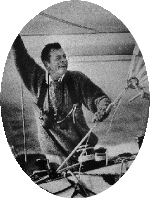 Philip Saltonstall Weld Photograph courtesy of Boston Globe
Philip Saltonstall Weld Photograph courtesy of Boston Globe |
On winter Sunday afternoons in Marblehead, Massachusetts, the frostbite dinghy regattas were not a terribly popular form of sailboat racing. "You'd go zinging around the harbor--four races, back to back--in the freezing cold," recalls Annie (Weld) Bell, who sometimes crewed for her father, Philip Weld. He wanted to hone his racing skills and, as the daughter laughingly recalls, "He had to look hard to find a crew."
Yet the bone-chilling preparation paid off in 1980 when Weld won a 3,000-mile race with no crew at all. At age 65, he beat 89 younger competitors in the London Observer-sponsored OSTAR (Observer Singlehanded TransAtlantic Race) on his 50-foot trimaran Moxie. By crossing the Atlantic in a record time of 17 days, 23 hours, he became "the fastest sailor in the history of the world."
Weld, who described this race in his memoir, Moxie, had a singular talent for taking on chaotic forces and finding a way through the most daunting troubles. Single-handed sailing was exhilarating; he was not attracted to America's Cup racing, with its big organizations and crews. "He was so good in high stress situations: keeping a level head, sorting out what needed to be done. He did not lose his cool," says Bell. "In long-distance sailing he was against the elements, and something in him loved that kind of challenge, being out in that wild territory."
At times the elements nearly won. In 1976, en route to an earlier OSTAR, a huge rogue wave north of Bermuda capsized Weld's trimaran Gulf Streamer, stranding him and a crewman for five days before a British container ship rescued them. Weld was unflappable. He had spoken with many sailors who had been in distress and, as he relates in the documentary film American Challenge, "You've got to see at least nine ships before you're rescued." At the suggestion of his wife, Anne (Warren), he christened his next trimaran Rogue Wave.
Phil Weld came from doubly old New England stock: his mother's family were Saltonstalls. (Massachusetts governor, and later U.S. Senator, Leverett Saltonstall '14, LL.B. '17, LL.D. '42, was his mother's cousin.) Yet he was "not the normal, quiet, self-effacing Yankee," says his daughter Eloise (Weld) Hodges '62 ('82). "He was a volcanic presence. He had very strong opinions and was impatient with those who couldn't keep up with him, or with complacent people who didn't have the vision to see what was coming down the pike. My father was always 10 to 15 years ahead of the moment. When he blew up about something, he didn't burn bridges--he bombed them."
At Harvard, Weld was president of the Porcellian Club and a reasonably diligent scholar--a consequence of landing on permanent probation after some drink-inspired hijinks on the first weekend of his freshman year. "I knew if I missed one class I was out," he later admitted. He never finished his senior thesis on Lord Byron, but essayed a romantic adventure of his own: one summer, accompanied by a friend from Harvard and Milton Academy, he ascended the Amazon to Ecuador and set out for the untamed haunts of the Jivaro Indians.
In World War II, impatient with the numbing routine of a training camp in Oregon, Weld volunteered as a commando, and parachuted behind Japanese lines in Burma. He enlisted as a private and was discharged as a second lieutenant, thrice decorated for valor as part of the celebrated Merrill's Marauders.
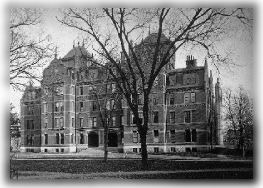
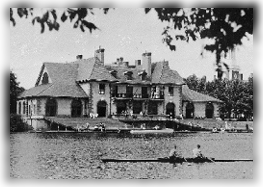
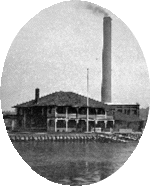 Top: Weld Hall, 1872, helped define the Old Yard. Middle: Weld Boathouse, 1906, the gateway to Harvard's athletic complex, and its predecessor (bottom). Photographs courtesy Harvard University Archives |
After the war, Weld resumed the newspaper career he had begun in Chicago in the late 1930s. Eventually he owned several town papers on Boston's North Shore and in New Hampshire. He and Anne moved to Dolliver's Neck in Gloucester in 1954, where, by the ocean, they raised a son and four daughters. After the Gulf Streamer calamity in 1976, Weld decided to simplify his estate in the event of another, more final, accident, and sold his publishing interests for $10 million in 1978.
His publishing savvy benefited this magazine, which he served as volunteer president and publisher between 1967 and 1972, and as a member of its governing boards until his death. He was instrumental in hiring John T. Bethell '54, the magazine's editor from 1966 to 1994; as a teenager in the late 1940s, Bethell had a job bundling and distributing copies of the Cape Ann Summer Sun, one of Weld's papers, and had later been an editor at another, the Beverly Times.
"He never wanted Harvard Magazine to become the mouthpiece of a monolithic Harvard and not have the guts to print anything critical of what Harvard was doing," Hodges recalls. "He didn't want Harvard to ever get self-complacent and feel it could get away without criticism." In 1969, when the police bust and student strike roiled the Yard, Harvard Magazine covered the story vividly in photographs and an eyewitness account by Bethell, and despite protests from officials and alumni who would have preferred the magazine to look the other way, Weld stood squarely behind the coverage, noting bluntly that "the motto of this institution is Veritas."
During the 1970s, which Weld described as "the happiest decade of my happy life," he nonetheless had to face some troubling truths of his own. In 1971, his firstborn, Philip Jr. '60, slipped into chronic manic depression. Weld père had regarded his son as the heir apparent ("It never occurred to him to have a daughter as heir apparent," Hodges wryly observes), and it was for many reasons deeply anguishing to see the young man disabled by illness and incapable of taking over the reins.
This may have been another reason for Weld's sale of his publishing interests and his increasing involvement with sailboat racing during the 1970s; on the ocean, one was completely absorbed by the conundrums of wind and water. And even there, Weld was a maverick. As an early convert to multihull boats, he relished not only the vastly greater speeds but the "outsider" status of the innovative catamaran and trimaran designs; he gleefully mocked traditional monohull boats as "heeler-keelers" as he whizzed past them in races.
In later years Weld became active in the nuclear disarmament movement. He also backed James Anderson, Philip S. Weld professor of atmospheric chemistry, in his pioneering work on ozone holes in the upper atmosphere (see "Reeling through the Stratosphere," January-February 1983). Weld endowed the chair Anderson now holds and, wanting to learn the relevant chemistry, hired an undergraduate to come to Gloucester and tutor him. He also underwrote the construction of an unmanned aircraft that could fly to high altitudes to document ozone depletion. Concerned about the nation's dependence on petroleum, he drew upon his sailing experience and plunged into the study of solar and wind energy--building a windmill, installing solar panels at home, and investing in U.S. Windpower, a utility that operated a string of windmills along the Southern California coast. "He felt wind had power," says Hodges. "He would read the Odyssey and quote the wind god Aeolus."
In a "retirement" that was actually a broadening out into several new careers, Weld had an array of exciting projects before him, making his sudden death at 69 especially unfortunate. On his last afternoon he attended a luncheon meeting of Harvard Magazine's board of incorporators, and again exhorted the editors to cover controversial issues; he even offered a cash prize for the best example of investigative reporting. Then, on his way through the Square to attend another meeting, he suffered a fatal heart attack. "We've always wondered whether he'd voted," says Hodges; her father died on Election Day 1984 and, typically, had been eager to vote for the underdog.
Another branch of the Weld family has its roots in New York. Susan (Roosevelt) Weld, herself a member of a distinguished Harvard family, joined the New York Welds with her marriage to William Floyd Weld '66, J.D. '70.
Susan Roosevelt Weld '70, J.D. '74, Ph.D. '90
In 1948, as Mao's revolution roiled China, an airplane of the China National Aviation Corporation crashed in Hong Kong harbor. Quentin Roosevelt, grandson of Theodore Roosevelt and vice president of that airline, which served Chiang Kai-shek's government, perished in the crash. Sabotage was suspected; the planes had been airlifting rice to some of the last cities held by the Nationalists. "Everything was so confusing in Hong Kong then," says Roosevelt's youngest daughter, Susan (Roosevelt) Weld '70, J.D. '74, Ph.D. '90, who is now a research fellow in East Asian legal studies. When her father died she was only eight months old; although born in Oyster Bay, Long Island, she had been christened in Shanghai.
After Roosevelt's death, his widow returned to Oyster Bay, where the little girl and her three sisters grew up in a house with their grandmother, mother, and three aunts. At that time and place, and in that social set, widows were often the objects of social neglect: "My mother was not invited to dinner parties," Weld recalls. In contrast, her parents' Chinese friends in New York were very loyal, and Weld became good friends with their children. The experience helped guide her toward her later career: in addition to her Harvard appointment, Weld teaches Chinese and Japanese law at Boston College Law School. She specializes in China's early "warring states" period; in the last decade she has visited the country two or three times a year to examine ancient tablets, view archaeological sites, or attend conferences.
Her childhood surroundings were comfortable. After grade school she attended Concord Academy and applied to two colleges: Stanford and Radcliffe. "I decided to go to the most distant one," she says. But after two years in Palo Alto she felt that "Stanford wasn't dark enough, not shady and shadowy enough. I loved those Cambridge alleys that you could sneak down and no one would see you."
Hence she transferred to Radcliffe, moved from science into East Asian studies, and took a year in Taiwan. "In those days that's what you did, since we couldn't go to mainland China," Weld recalls. At Radcliffe she played a little squash and a lot of Pine Orchard Poison, a complicated two-pack game of solitaire. She remembers sitting on her bed listening to the demonstrations by Students for a Democratic Society (SDS) taking place outside. Weld opposed the Vietnam War and had picketed the Selective Service office in Oakland, California, but, she says, "I remember the vulnerability and youth of the state police who were used to control the demonstrators. These 18-year-old recruits were shaking with fear, literally trembling. The idea that 'These are pigs and you have to be against them' was ridiculous. I think the cause is important all on its own, and doesn't have to involve demonizing ordinary people who are caught up in it one way or the other."
After college, government funding for graduate studies seemed to be drying up, so Weld took a law degree and practiced for five years. "I did everything under the sun," she says. "Pensions, tax, small corporations, litigation." After her 1975 marriage to William Weld '66, J.D. '70, the couple moved from New York City to Cambridge, where they bought a large old house "that was going cheap because of oil-crisis prices--it's still impossible to heat."
Her husband began his career as a lawyer and now practices in New York and Boston with McDermott, Will, & Emery. William Weld took time out to serve as a federal prosecutor and later as governor of Massachusetts (from 1990 to 1997), a job he resigned to pursue a quixotic, doomed bid to become U.S. ambassador to Mexico over the wishes of a fellow Republican, Senator Jesse Helms. Bill Weld comes by wealth and power congenitally: his middle name, Floyd, is the surname of a signer of the Declaration of Independence, and his paternal forebears founded the Wall Street investment house White, Weld & Company. He grew up on Long Island in a house whose driveway was a mile and a half long. Yet he has always had the common touch. Once, when Massachusetts Senate president William Bulger kidded Governor Weld publicly about his ancestors having come over on the Mayflower, Weld rose on the dais with a correction: "Actually they weren't on the Mayflower. They sent the servants over first to get the cottage ready." (He had honed his public persona at Harvard, where he earned a summa in classics and donned drag for Hasty Pudding shows--an experience that may have inspired his exhortation to seniors at 1998 Class Day exercises: "Carpe diem...do some high stepping, kick up your heels. Show a little leg.")
In Cambridge, the Welds have raised their children David '98 (see below), Ethel, Mary, Quentin, and Francis. The two youngest are at Milton Academy, Mary attends Yale, and Ethel, a graduate of Cambridge Rindge and Latin, the local public high school, is enrolled at New York University. "Ethel is very opposed to Ivy League schools," her mother notes. "She considers them elitist bastions."
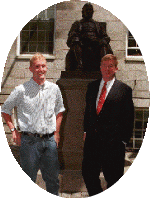 David and William Weld, Class Day 1998 Photograph by Rose Lincoln, Harvard University News Office
David and William Weld, Class Day 1998 Photograph by Rose Lincoln, Harvard University News Office |
David Weld '98
"Our father used to tell us that all our ancestors were opium smugglers--it's pretty much the family business," says David Weld '98. "I've even had a hand in it myself." This example of drollery is only one of the ways that Weld père et fils resemble each other: in both, the deadpan humor comes packaged with high intellect.
David Weld concentrated in physics, earned a magna, and may begin a Ph.D. program at Stanford after taking a year off to work for a computer company. "Physics is really cool," he says. "It's the most fundamental of the sciences, and it seems to use parts of one's brain that other fields don't use. It's a strange trick, to get equations to relate to the real world. There are so many different things in physics: you can do computer programming, build cool stuff, use machines. And people give you unbelievable quantities of money to do it! Physics graduate school is pretty much free for everybody, while medical school is unbelievably expensive."
At Harvard, Weld lived in Eliot House and joined the board of the Advocate, the College's oldest literary magazine. "I've written things myself, but have never submitted any for publication," he says. "I like to read literature." But he figured, "If I'm an English major, I'm never going to do anything with physics because you can't do that stuff on your own. As a physics major, I can always read." He also took two years of Chinese. "I was drawn to Chinese because it's so different from English," he explains. "In restaurants, my mother used to teach us how to draw ideograms on napkins." Weld began taking squash seriously in his sophomore year; as a junior and senior he played for Harvard's junior varsity team. He sometimes gets onto the court with his father. "Squash was really fun," he says. "In our branch of the Weld family, everybody is extremely bad at sports."
He displays a filial irreverence toward his dad's political career. "In 1979 my father ran for attorney general, and it was not a very successful outing," he says, grinning. "He lost by the largest margin of any statewide race in history, I think. Then [Democratic gubernatorial nominee] John Silber made some injudicious comments and Dad was suddenly governor." More soberly, Weld remembers standing on stage at the 1990 Massachusetts Republican Convention when "one guy was holding up a baby to my father, yelling, 'Hey, Bill, do you want to kill this baby?'" David Weld says the film Wag the Dog, in which a U.S. president starts a war to divert attention from domestic problems, is "not even a parody--it doesn't go far enough. I've heard some far more cynical things."
Rose Saltonstall Weld '90
This is loyalty to one's roots: born in Beverly Hospital in Beverly, Massachusetts, Rose Saltonstall Weld '90, M.D., now works there as a resident in family practice. In her branch of the family, Dr. Weld is a bit of a black sheep: grandfather Philip Saltonstall Weld, father Philip S. Weld Jr. '60, mother Elizabeth (New) Weld Nolan, sister Sarah Weld '87, even her stepfather--Boston Globe columnist Martin F. Nolan, IOP '78--are "all writers or newspaper types," she points out. "But I always had a lot of trouble with writing. Being at the bottom of the heap in this group was intimidating. So I went in my own direction."
At Harvard she concentrated in biological anthropology and played field hockey and lacrosse, briefly. Her college athletic career reached its pinnacle when, in her senior year, she coordinated the Mather House intramural sports program that captured the Straus Cup. Interest in a medical career did not germinate until the summer after her junior year, when she worked for a young neurobiologist in a laboratory at Tufts. After graduation, Weld took premedical courses at night at Harvard Extension School and Northeastern University while working days in a lab at Harvard Medical School. She eventually earned her M.D. from the University of Pittsburgh--"Harvard would not grant me an interview," she notes, without rancor. In fact, she found the change of venue "a good thing--I hadn't lived outside the Northeast."
The home turf had already offered vicissitudes aplenty. Her father's manic depression manifested itself when she was only 3 years old, and his condition, she says, "was not adequately diagnosed or aggressively treated." The paternal mood swings caused frightening experiences in her childhood. "My Dad was hospitalized many times when I was young," she recalls. "Lots of times I didn't know what the adults were talking about; they would say things like, 'Is he on his way up?'" After 17 years of marriage, Weld's parents divorced in 1980. Her mother remarried and her father moved to California, remarried, divorced again, and died in 1987 of a pre-leukemic blood disorder.
Rose Weld's own marital life has only just begun. In September she married classmate Michael Dorrington, whom she met when they were sophomores; he is now with the Boston law firm of Sullivan & Worcester. Their wedding ceremony took place in Boston, at King's Chapel on Tremont Street, the same church in which Anne Warren married Rose Weld's grandfather, Philip Saltonstall Weld, in 1937.
"I don't talk about the Welds that much because we're a big, prominent family, and most people my age aren't from big, prom-inent families," she says. "You go to school with people who may be the first in their family to attend college--and you've got 10 generations of ancestors who went to Harvard."